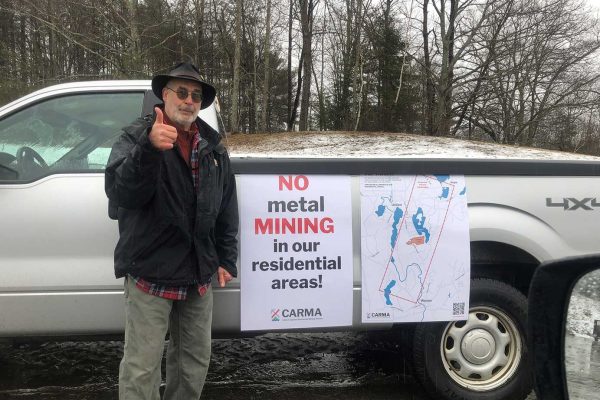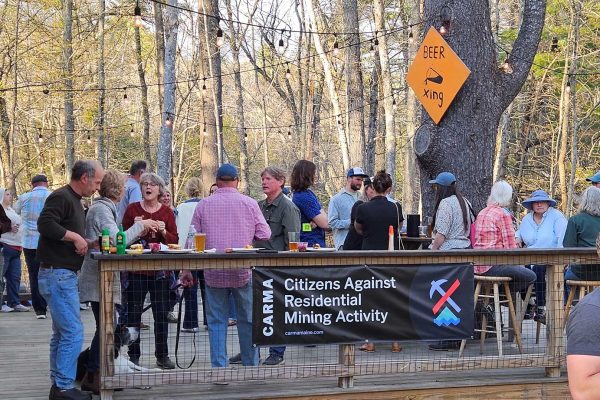In mid-February of 2023, residents in the towns of Union and Warren were stunned when they learned that Canadian company Exiro would be coming to town to pitch a proposal for exploring known nickel deposits in and around Crawford Pond—a body of water that spans both towns.
By the time Exiro arrived, trying to persuade residents of its good intentions, the company had already met with town officials and had quietly acquired mineral rights to a 180-acre logging property very close to and sloping toward the pond. Exiro was also in the process of privately attempting to secure additional mineral and property rights in the area, offering promises of vast wealth, employment, and economic benefits to residents.
Mining in a Residential Area—Seriously?
This is not an isolated or remote area. There are thousands of residents living in these towns (which also includes Hope) who rely on an interconnected watershed. There are 36 parcels directly abutting the property where Exiro had acquired mineral rights, and more than 400 parcels within a one-mile radius of the property. Exiro’s proposed 30-square-mile exploration area also included town centers, parks, libraries, and schools.
Warren, Union, and Hope are part of an interconnected watershed, a superhighway for mine seepage. Contamination from mining activity would spread from the contamination site through the area’s connected wetlands and waterways including Crawford Pond, Seven Tree Pond, Lermond Pond, Alford Lake, White Oak Pond, North Pond, the St. George River and its tributaries and estuary, and out into the bay. Of note, from these waterways, contamination would percolate into the aquifer from which Warren, Union, and Hope residents draw their drinking water.
CARMA Responds
 The overwhelming opposition from residents was loud and angry. The towns, understandably, were trying to remain neutral and follow standard protocol for addressing the issue, which could take a year or more. Believing that they needed to engage in a swift and aggressive grassroots advocacy campaign, six residents huddled up over Zoom to launch what became known as “Citizens Against Residential Mining Activity,” or “CARMA,” which has relied on the resources and expertise provided by the Natural Resources Council of Maine to support its efforts.
The overwhelming opposition from residents was loud and angry. The towns, understandably, were trying to remain neutral and follow standard protocol for addressing the issue, which could take a year or more. Believing that they needed to engage in a swift and aggressive grassroots advocacy campaign, six residents huddled up over Zoom to launch what became known as “Citizens Against Residential Mining Activity,” or “CARMA,” which has relied on the resources and expertise provided by the Natural Resources Council of Maine to support its efforts.
CARMA’s founders represented a wide range of backgrounds—one was a commercial diver, one was a corporate litigator, one was a lobbyist, one was a database specialist, one was a cannabis farmer, one was a micro-brewer, and one was a private yacht captain. Yet they were united by one laser-focused objective: preserving the water quality and beauty of their beloved Maine towns.
Their goal was shared by thousands of residents, so they knew they had to act quickly before Exiro strengthened its foothold in their towns. They set three objectives for themselves: (1) communicate strong opposition directly to Exiro; (2) raise money; and (3) adopt a legal strategy to strictly regulate and control mining activity in their towns. And they did just that!
Executing the Strategy
CARMA began by putting a stake in the ground, issuing a press release announcing their formation and their goals while also writing to Exiro, demanding that the company back off and disclose information about its financial condition and intentions. As a private entity, little could be learned about Exiro, and the company declined to meet CARMA’s demands for transparency. Exiro’s unwillingness to provide information about itself was further indication to CARMA of its untrustworthiness.
Then, CARMA launched a community educational forum, a series of fundraisers, and rallies to generate resources and momentum for what was about to come next: the legal strategy. Aware that another town (Pembroke) had recently adopted land use ordinance amendments to restrict another mining company (Wolfden) from extracting silver, CARMA retained the same lawyer who had advised that citizens’ group. Then, CARMA added to its legal team a local lawyer who had served on the Union Planning Board to advise on local process.
 Within weeks, CARMA presented a legal strategy to both towns that would allow Warren and Union residents to vote for stricter regulations and controls on mining at the annual town meetings in June. To get these measures to a vote, however, CARMA needed to gather hundreds of signatures on a citizens’ petition well in advance of June. They mobilized their volunteer force in the wind, snow, and cold to stand outside local markets and other public locations to educate, advocate, and ask for signatures. CARMA was also emboldened by 45 local businesses that signed a public letter opposing mining.
Within weeks, CARMA presented a legal strategy to both towns that would allow Warren and Union residents to vote for stricter regulations and controls on mining at the annual town meetings in June. To get these measures to a vote, however, CARMA needed to gather hundreds of signatures on a citizens’ petition well in advance of June. They mobilized their volunteer force in the wind, snow, and cold to stand outside local markets and other public locations to educate, advocate, and ask for signatures. CARMA was also emboldened by 45 local businesses that signed a public letter opposing mining.
“We knew there was overwhelming support for our mission, but we had to show it to Exiro, which meant getting residents and businesses to put their names on a petition or a letter,” said Dave Stuart, one of CARMA’s founders. “We had to show Exiro that we were prepared to fight tooth and nail to prevent them from recklessly exploiting our towns.”
The communities of Warren and Union responded by asking residents in April to vote at a special meeting to enact six-month mining moratoriums in both towns. Voters lined up outside voting locations waiting to get inside packed rooms to cast their votes. Across both towns, 238 residents showed up, and all but 2 residents (!) voted to enact moratoriums.
Two months later, at the annual meeting in June, Union residents were given the opportunity to vote on the stricter mining regulations proposed by CARMA. And they did, with 82% of the votes supporting the stricter mining regulation, which is now the law of the land in Union. Warren chose a different path, electing to extend its moratorium and establish a citizens’ advisory committee to study the issue, which it is now doing. In Hope, on July 20, residents also voted unanimously to enact a mining moratorium. The Hope Select Board Chair declared the turnout to be the largest for any meeting in recent history.
What’s Next for CARMA?
CARMA is not done. CARMA knows that any local protections can be undermined by the State Legislature if persuaded by a powerful and well-heeled mining industry. CARMA continues to rely on support from the Natural Resources Council of Maine for education and advice.
Kathy Wellen (another CARMA founder) said, “CARMA’s goal has always been to continue its advocacy beyond Warren, Union, and Hope. We want to take our expertise, resources, and learning to other towns and be active with the Legislature and Governor’s office. And we have the drive to do it!”
—guest post by Citizens Against Residential Mining Activity










Leave a Reply